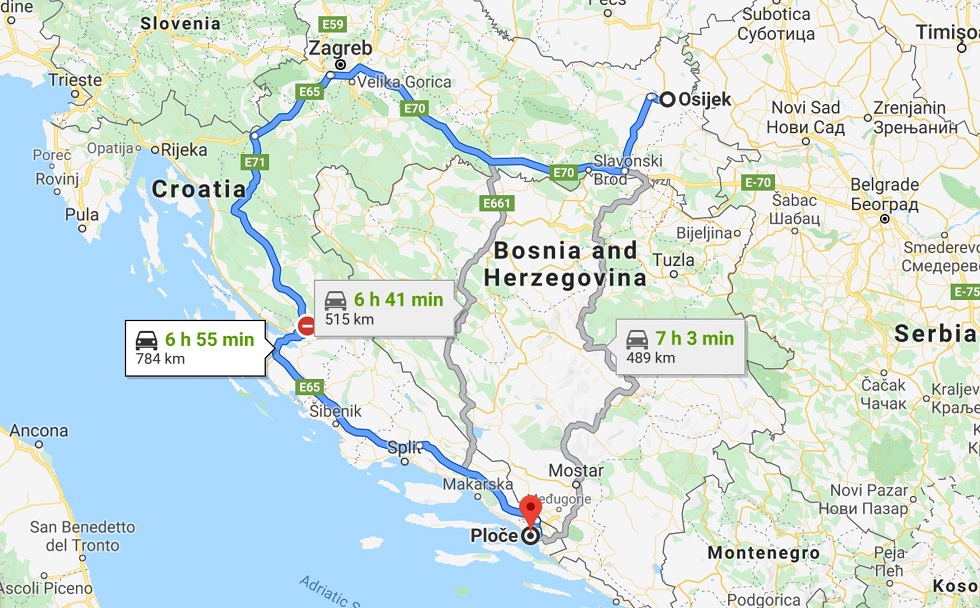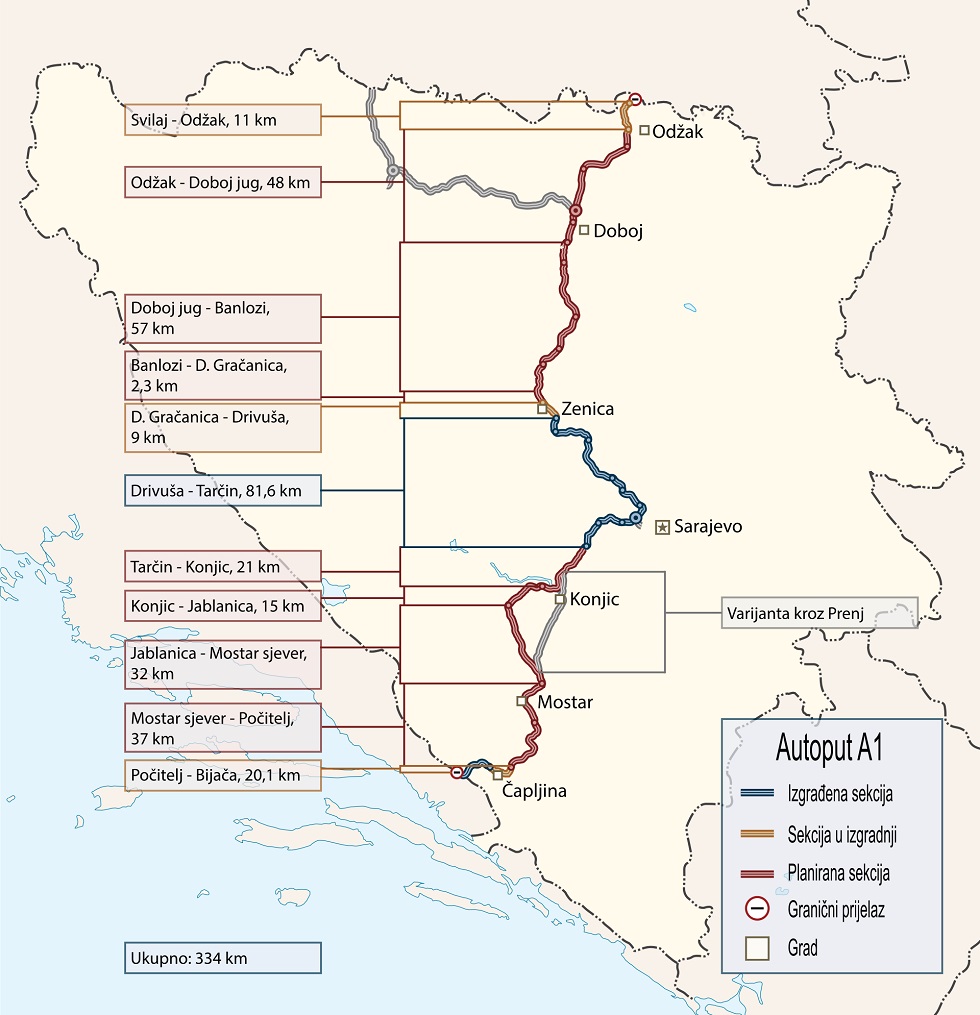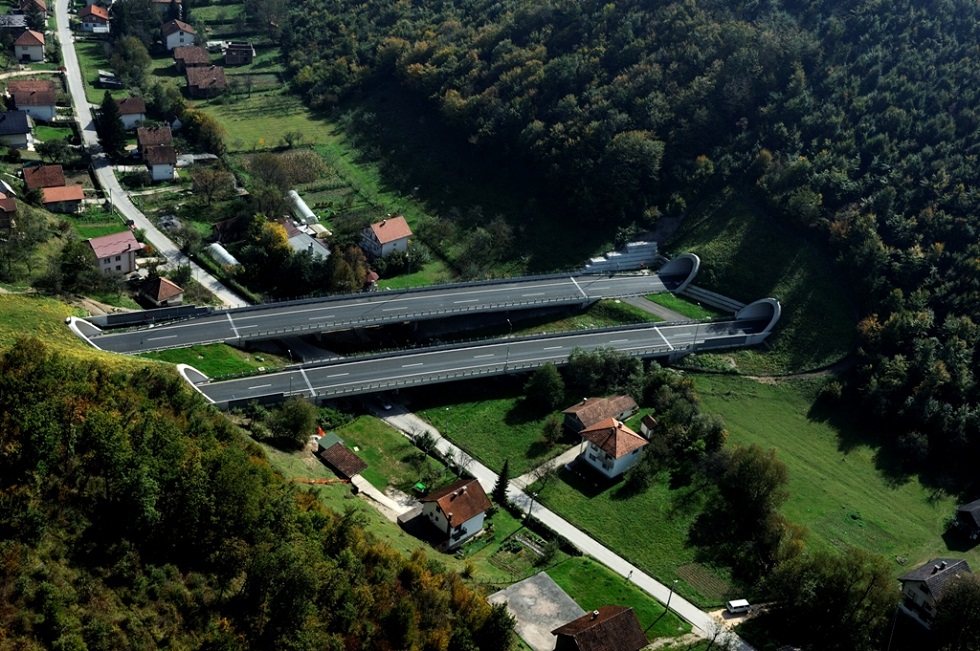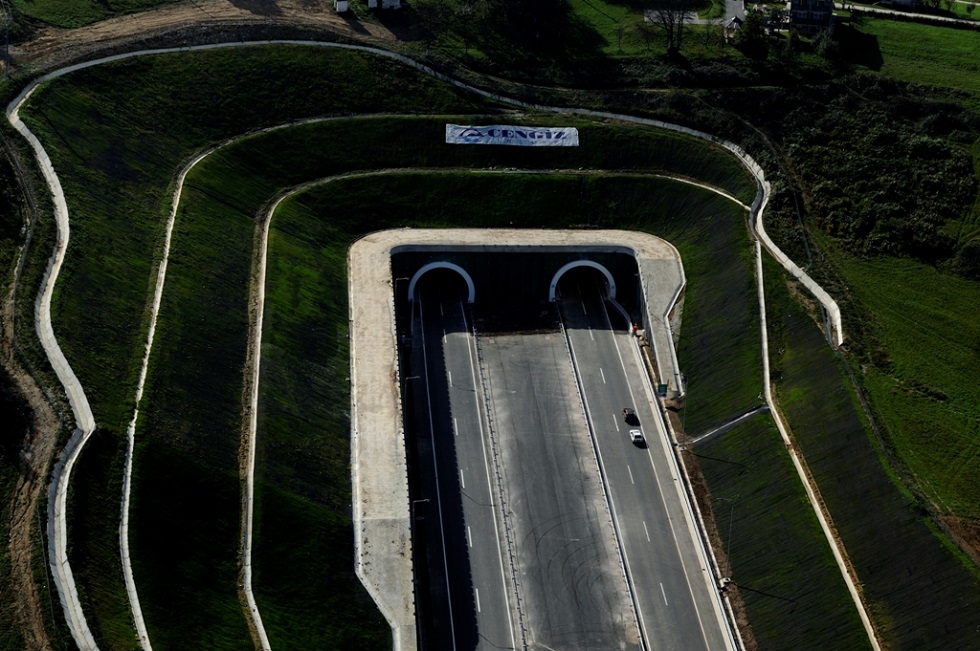Revenue from Road Tolls Exceeds 3 Billion Kuna for First Time in History
ZAGREB, January 2, 2020 - In 2019 revenue from road tolls on motorways operated by the Hrvatske Autoceste (HAC) and Autocesta Rijeka-Zagreb (ARZ) companies amounted to more than 3 billion kuna, which is the most ever, and that it was collected from 61.56 million vehicles, HAC said on Thursday.
According to the first data for 2019, a total of 61,565,203 vehicles was recorded on all motorways operated by HAC and ARZ, bringing in a revenue of 3.004 billion kuna in road tolls. This is the first time in history that revenue from road tolls exceeded 3 billion kuna, HAC said.
HAC underscored that compared to 2018 revenue from road tolls increased by 4.3% in 2019 and there were 5% more vehicles.
HAC pointed out that the highest revenue from road tolls was generated on the A3 motorway (Bregana-Zagreb-Lipovac), amounting to 992 million kuna.
The most significant revenue by month was generated in August (475 million).
More than 60% of tolls collected in 2019 were cashless, paid by ENC passes or various credit cards.
HAC noted that there was an increase in traffic on motorways in the off-season too in 2019 compared to 2018.
More news about Croatians roads can be found in the Travel section.
Slavonia to Dalmatia in Under 4 Hours: The A1 Motorway
The Autoput A1, a motorway which will run through Bosnia and Hercegovina, is currently under construction. It will span 334 km when completed and will be the fastest route between Slavonia and Dalmatia.
Why is the A1 important for Croatia, Slavonia and Dalmatia?
According to Google Maps, it currently takes roughly the same amount of time (7 hours) to drive from Osijek (in Slavonia) to Ploče (in Dalmatia), either by staying within Croatian borders or crossing through Bosnia. The Croatian route is a 784 km drive, while current routes through Bosnia are up to 200 km less. Nevertheless, the drive through Croatia remains on four-lane motorways, which are built for speeds of up to 130 km, while the two routes through Bosnia mostly involve two-lane roads where speed limits vary, but are capped at 80 km.

The Autoput A1, which will span Eastern Bosnia, will be an estimated 334 km in length. It is approximately 72 km from Osijek to the Bosnian border, and about 24 km from the Bosnian border to Ploče. Once the A1 is complete, it will be a about a 430 km drive from Osijek to Ploče, which is 354 km less than the current Croatian route and will take less than 4 hours!
The route also provides a faster connection from the rich agricultural region of Slavonia to the Port of Ploče, a key Adriatic port in Southern Dalmatia.

Why is the A1 important for Bosnia and the entire region?
As well as providing a connection to the Port of Ploče, the A1 will connect four major Bosnian cities: Doboj, Zenica, Sarajevo and Mostar. It also connects Međugorje, Kravice and Počitelj; all of which are world-class tourist destinations.
The A1 is part of European Route E73/Corridor Vc, which will connect the above-mentioned towns and cities to Budapest, Hungary.

What are the environmental concerns?
The A1 highway route has been criticized by environmentalists, concerned citizens, and factions of the academic community and media for its encroachment on many endangered natural phenomenon, habitats and traditional ways of life in the Dinaric karst region.
This is especially emphasized in the region of Herzegovina where most of Bosnia and Herzegovina's karstic topography and biodiversity can be found. Planners have been addressing concerns by proposing variants to the route in the problematic sections.

How much of the A1 has been completed? What areas are currently under construction?
About 90 km of the 334 km route have been completed so far. Those areas include an 81 km span between Drivuša and Tarčin and a 10 km span between Bijača and Čapljina.
There is 30 km of motorway under construction in the following regions: 11 km between Svilaj and Odžak and 9 km between D. Gračanica and Tarčin. The 10km between Čapljina and Počitelj, was recently contracted to China State Construction Engineering Corporation Limited and is scheduled for completion in 2021.
This means that there will be about 120 km of the 334 km route completed within the next couple of years.
Here is a video from JP Autoceste FBiH, which provides an overview of the route:
And a September 2019 video update on the section between Vranduk and Ponirak (near Zenica):
For more information and updates on the construction of the A1, check out the JP Autoceste FBiH website here.
To follow infrastructure developments and updates in Croatia and neighboring countries, follow our Travel and Lifestyle pages.
Contracts for Ston Ring Road and Access Roads to Pelješac Bridge Signed
ZAGREB, October 9, 2019 - Contracts for the construction of access roads to the Pelješac Bridge and the Ston ring road were signed on Wednesday by the government and the Strabag and Avax companies, concluding the tender procedure which was ridden with appeals, and now construction can finally commence.
The Duboka-Šparagovići/Zaradeže section will be built by the Austrian Strabag company while the Ston ring road and the sub-sections Šparagovići/Zaradeže-Prapratno and Prapratno-Doli will be built by the Greek Avax company. All in all, this involves about 30 kilometres of access roads.
Strabag's price for its section amounts to 478.3 million kuna without VAT, while Avax's price for its section was 511.5 million kuna without VAT.
The section to be constructed by Avax should be completed in 28 months' time while Strabag's project will be completed in 33 months. Construction is expected to start within the next two and a half months.
Minister of Maritime Affairs, Transport and Infrastructure Oleg Butković said that today's contract signing concludes the first phase of the tender and that construction of access roads can now begin, adding that he did not expect any problems during construction but that one never knew what can happen in the future.
Asked whether he was afraid things could go wrong, Butković said that considering the contractors, the process and documentation prepared by the Hrvatske Ceste road operator, the good designers and good supervision, he did not expect any major problems, as these are global companies.
He believes that the situation has been defined and does not expect any lawsuits to be lodged at the Administrative Court which, he said, would not prevent the construction of the access roads. He could not say whether there would be any time difference between the completion of the Pelješac Bridge itself and the access roads.
"I believe that everything will be completed in this financial perspective, because we have to do it. We have to spend this money by the end of 2023 and that will occur before that," said Butković.
He added that this is a demanding project and one of the most important infrastructure projects in the country.
Hrvatske Ceste CEO Josip Škorić said that total value of the contract signed today was a little less than 990 million kuna and, together with the bridge, the total amount of 3.1 billion kuna.
Avax director general Christos Ioannou said that the company was pleased to be able to participate in this project and that it will certainly be completed well and in time, while Strabag's director Veljko Nižetić underscored that Strabag considers this to be an important project and that Strabag has been present in Croatia for more than 20 years.
Prime Minister Andrej Plenković attended the signing ceremony and wished the contractors the best of luck and speedy completion of works.
Both Strabag and Avax appealed against each other to the State Commission for Supervision of Public Procurement Procedures. The commission rejected both appeals.
More news about Pelješac Bridge can be found in the Business section.
Bikers Protest Against Road Toll Collection on Krk Bridge
ZAGREB, June 29, 2019 - Bikers from Rijeka and Primorje-Gorski Kotar County on Saturday staged a protest against the collection of the road toll on the bridge connecting the mainland with the northern Adriatic island of Krk, slowing down traffic by paying the road toll with small change.
Traffic across the bridge, which is usually dense at this time of the tourist season, was significantly slower on Saturday morning.
Police were regulating traffic, directing bikers to one of the four open road toll collection points.
The protesting bikers said that the purpose of their action was to have road toll collection on the Krk bridge cancelled as the bridge had long been paid for and was the only bridge in the country where the road toll was still collected.
Asked to comment on the protest, Transport Minister Oleg Butković said in Rijeka that the protesters were harming themselves and Croatia but noted that there were grounds to abolish the road toll for the Krk bridge.
"We are conducting talks with the World Bank in that regard. The total debt of the road sector is 5.5 billion euro and we cannot make a decision of that kind without international creditors who helped finance the construction of motorways and refinance the debt," Butković said, adding that the government would cancel road toll collection for the Krk bridge if such a move was approved by international creditors.
More Krk news can be found in the Lifestyle section.
Road and Motorway Operators Plan to Invest over 3.2 Billion Kuna
ZAGREB, June 19, 2019 - The state-owned roads operator Hrvatske Ceste (HC) plans to invest 2.6 billion kuna in road construction and maintenance this year, while the Hrvatske Autoceste (HAC) motorways company will invest 627 million kuna for the same purpose, Minister of Maritime Affairs, Transport and Infrastructure Oleg Butković told a cabinet meeting on Wednesday.
HC will invest 942 million kuna, or 37 percent of the planned amount, in road construction using EU funds, 640 million kuna or 25 percent in road construction using own funds, 548 million kuna or 21 percent in reconstruction and maintenance, and 423 million kuna or 17 percent in regular and extraordinary maintenance.
Among the key projects mentioned by the minister are road connectivity with southern Dalmatia (3.2 billion kuna), a multi-modal platform in the Split agglomeration (2.44 billion kuna), the DC 403 road in the Rijeka area (500 million kuna), and the Okučani-Gradiška junction and bridge across the Sava river (530 million kuna).
HAC plans to invest 245 million kuna of own funds, or 39 percent of the planned amount, in motorway construction, 224 million kuna of own funds, or 36 percent, in extraordinary maintenance, HRK 62 million of EU funds, or 10 percent, in construction and extraordinary maintenance, and the remaining 97 million kuna, or 15 percent, in construction and maintenance.
HAC's ongoing investment projects include work on the Beli Manastir - Halas bridge section of the Corridor Vc motorway, while the section between Beli Manastir and the Hungarian border, the Novi Vinodolski ring road and the Lekenik-Sisak section are under preparation.
More news about Croatian roads can be found in the Business section.
Pelješac Bridge Access Roads Will Be Ready on Time, Says Minister
ZAGREB, May 30, 2019 - The national road operator Hrvatske Ceste (HC) took into account of possible appeals, lawsuits and so on with regard to access roads to the Pelješac Bridge, and now it is necessary to wait for the court's decision on the appeal that was lodged, but all the works will be completed within the set deadlines, Minister of Maritime Affairs, Transport, and Infrastructure Oleg Butković told reporters on Thursday.
Butković said that "we are used to that and nothing we haven't seen before is occurring," and that "no one, including the Croatian government, prime minister, ministers or HC's director can or is allowed to influence the independent decisions of the courts or the State Commission for Supervision of Public Procurement Procedures because they are independent bodies.
"All I can do is appeal on those institutions to make their decision as soon as possible," Butković said, adding that the court had 30 days to decide on the appeals and then it will be known who the contractor for the access roads will be.
The appeal was lodged on May 15, so the court should deliver its decision by June 15, he said and added that if the appeal is rejected, HC would sign the contract for the road construction, and if the appellant is not satisfied with the decision, it has the opportunity to appeal to the Administrative Court, but that will not halt the works.
The latest hitch emerged after the Greek Avax company lodged an appeal to the High Administrative Court (VUS) in mid-May against a decision by the State Commission for Supervision of Public Procurement Procedures quashing a decision by HC that the access roads to the Pelješac Bridge be built by that company.
On May 16, VUS confirmed that it had received Avax's appeal. Under the Public Procurement Act, a decision has to be delivered within 30 days.
More Pelješac Bridge news can be found in the Business section.
Introducing 3D Signalling for Driving in Wrong Direction on Croatian Motorways
The Croatian Motorways public company (HAC) has begun the implementation of a pilot project to install horizontal signalling with 3D effect at ten junctions and five rest stops that will alert drivers who are driving in the wrong direction, reports Večernji List on May 3, 2019.
The HAC says they receive about 200 reports a year of driving in the wrong direction on the motorways, but not all reports are confirmed. Some drivers realize their mistake on time and then return to the right direction before the police arrive. However, about 70 per cent of the reports are confirmed, but most end with no serious consequences or traffic accidents. Still, since 2007, 38 accidents occurred on the HAC motorways due to driving in the wrong direction and 11 people were killed, while 47 were injured.
The HAC says that vehicles moving in the opposite direction on motorways represent a serious threat to the safety of all traffic participants. Such driving often ends with a frontal crash and, although the number of such violations is not large, the consequences are often severe injuries and deaths. The mistake most commonly occurs at junctions and rest stops due to drivers being tired, people driving under the influence, a fall in concentration, people not noticing traffic signals or, in the worst case, due to the self-destructive behaviour of some drivers.
The HAC says that the existing traffic signalling preventing the entry of vehicles in the wrong direction is not enough and needs to be supplemented. Horizontal 3D traffic signalization would thus, together with the existing vertical signalisation, act as a physical obstacle, further alerting drivers that they are driving in the wrong direction.
The HAC states that such a way of preventing vehicle entry in the opposite direction is unique in Europe and is used as a pilot-project only in Austria. The horizontal 3D traffic signalling consists of two sections. The first part is made up of several smaller elements, usually three, that create a 3D effect of spikes, while the second part consists of a 3D effect of an elevated surface.
The HAC has prepared an analytical report on 3D traffic signalling and has received consent from the Ministry of the Maritime Affairs, Transport and Infrastructure. They have developed the tender documentation and are now launching a public procurement process for the project implementation. The estimated value of the works is one million kuna. For the pilot project, the junctions and rest stops with most incidents involving driving in the wrong direction have been selected.
At each junction, the signalling will be placed at two spots where it is possible to enter the motorway in the wrong direction, while at the rest stops it will be placed at a single location.
The HAC expects that the implementation of the project will start after the tourist season when they complete the public procurement procedure and conclude the contract with the winning bidder. They will then track and analyse the data for a year to see if the project was successful. The HAC expects that the number of incidents with driving in the wrong direction will be reduced.
Translated from Večernji List (reported by Josip Bohutinski).
More news about Croatian motorways can be found in the Travel section.
Selection of Contractor for Pelješac Bridge Access Roads Annulled
ZAGREB, April 13, 2019 - The State Commission for Supervision of Public Procurement Procedures (Dkom) decided on Friday to annul the state-owned Hrvatske Ceste (HC) road operator's decision to award the Greek company J&P Avax a contract to build the Pelješac Bridge access roads, ordering HC to pay 100,000 kuna within eight days to a group of bidders led by Austria's Strabag to cover their appeals procedure costs.
HC invited bids for the construction of said access road to the Pelješac Bridge on 9 March 2018, and decided on February 28 this year to award the contract to J&P Avax. Seven bids had been submitted, of which four were shortlisted, and Dkom found the one by J&P Avax to be the most favourable in financial terms.
Construction was expected to last 33 months. J&P Avax's offer was 464.9 million kuna before VAT.
One of the bidders was the Bosnian company Integral Inzenjering, which asked for 321.2 million kuna but was turned down after HC said the bid price was unusually low.
GP Krk and Euro-Asfalt offered 444.3 million kuna, Greece's Aktor asked for 464.6 million kuna, the Croatian branch of France's Colas asked for 521.9 million kuna, Strabag asked for 478.3 million kuna, while the China Road and Bridge Corporation, which is building the Pelješac Bridge, asked for 647.8 million kuna for said road section.
The section on which access roads to the bridge will be built is 12 kilometres long. HC's deadline for the completion of all works is 31 January 2022, the same deadline for the completion of works on all four stages of the complex project that will link southern Dalmatia with the rest of the country by road.
In mid-March, Strabag and Aktor lodged appeals against the choice of contractor for the Duboka-Šparagovići section. Earlier this month, Dkom dismissed Aktor's appeal because the company paid too little to instigate the appeals procedure.
As for Strabag's appeal, in which the company contested the legality of the bid evaluation process and the validity of J&V Avax's bid, Dkom found that it was well-grounded and granted Strabag's request that it be paid 100,000 kuna to cover the appeals procedure costs.
More news about Pelješac Bridge construction can be found in the Business section.
Svilaj Bridge Between Croatia and Bosnia to Be Opened in Autumn
ZAGREB, March 1, 2019 - The Svilaj bridge across the Sava River along the Vc pan-European road corridor, which is being built by Croatia and Bosnia and Herzegovina, is expected to be completed this autumn, Croatian Transport Minister Oleg Butković said at the construction site on Thursday.
Butković said that the 22.3 million euro highway bridge was one of the most important infrastructure projects currently underway in Croatia. The project is financed by Croatia and Bosnia and Herzegovina in the 50:50 ratio, and the Croatian part is co-financed from EU funds.
"This bridge is of the utmost importance for the two countries and aside from connecting them, it will connect Budapest with (the southern Croatian port of) Ploče, which is what we want," said Butković.
The Croatian Roads road construction and maintenance operator has published a tender for the construction of a highway section to run towards Beli Manastir, close to the border with Hungary, and the bids will be opened in March, said the minister.
Asked why the construction of the 33-kilometre section from Osijek to Beli Manastir was taking so long, he said that the necessary funding had to be secured first.
He said that once the Svilaj bridge was completed and work on the highway to Beli Manastir was finished, which was expected in two years' time, a five-kilometre section towards the Hungarian border, currently being designed, would remain to be built as part of the Croatian section of the Vc corridor.
Bosnia and Herzegovina Deputy Communications and Transport Minister Saša Dalipagić said that the bridge at Svilaj was of huge importance for Bosnia and Herzegovina, notably for people living in the area gravitating towards Svilaj and Odzak. "Our two friendly and neighbouring countries are now connected at this location as well, and that pleases us the most," said Dalipagić.
He admitted that Bosnia and Herzegovina had been late in building its section of the Vc corridor because it had not had the necessary strategic documents, such as a framework transport policy or transport strategy.
He also said that the most important issue, the financing of construction work on the Bosnia and Herzegovina section of the corridor, had not been solved.
Dalipagić would not forecast when the section of the corridor running through Bosnia and Herzegovina could be completed, saying only, "You are aware of the reality in Bosnia and Herzegovina."
The Svilaj bridge is 660 metres long and 18 metres high. Once the bridge is completed, the Croatian section of the Vc corridor will be 59 kilometres long, said Croatian Highways CEO Boris Huzjan.
Work on the bridge started in September 2016. Croatia has built a highway to the bridge while work in Bosnia and Herzegovina on the section from the bridge to Odzak, a municipality in the northeast of Bosnia and Herzegovina, is expected to be completed at the same time as the bridge.
More news on the relations between Croatia and Bosnia and Herzegovina can be found in the Politics section.
Greek Company J&P Avax Selected to Build Pelješac Bridge Access Roads
ZAGREB, February 28, 2019 - The state-run Croatian Road operator (HC) has decided to select the Greek company J&P Avax to build the Duboka - Šparagovići/Zaradeze section of access roads to Pelješac Bridge at the price of 464.9 million kuna before Value Added Tax.
According to a press release issued by the HC on Thursday, a total of seven bids were submitted for the construction of the 12-kilometre long access road.
Of those seven bids, four were shortlisted, and the commission found the offer made by J&P Avax, to be the most favourable in financial terms.
The selected bidder is expected to wrap up the construction by 31 January 2022.
One of those seven bids was disqualified after the commission found that the listed price of 321.1 million kuna as offered by the Integral Inžinjerig company from Bosnia and Herzegovina was unusually low.
More news on the Pelješac Bridge construction can be found in the Business section.


